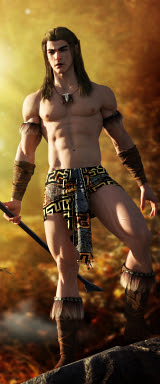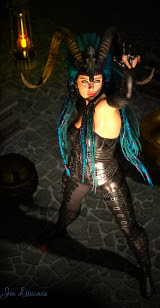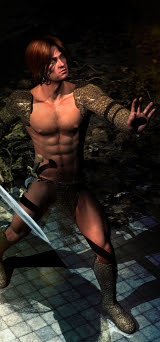 |
click to see all images at larger size |
Chapter Five
The night was calm, and not really cold at all. As fear dwindled, Martin realized that most of his chill had been the result of sheer dread, while the late summer evening was actually clement, pleasant. The sky was a vast, deep blue inverted bowl, with the last traces of the sunset that would linger for an hour yet, and an ocean of stars.
On any other evening, he would have said it was a glorious night for a ride, and if someone like Leon had taken him outside the walls of Esketh after curfew, Martin would have been breaking no laws. Tonight, he saw the same stars, felt the same soft breeze on his face, but he could feel Leon’s anger in the stiffness of his spine, and he knew the reckoning was coming.
Soon enough, he saw the old cenotaph in the distance, where the badlands gave way to high pastures. Goats and sheep grazed there, and trees began to overcome the thorn bushes and stones. Bats called out of the darkness as the gypsy horse approached, and Leon knew these trails. He took the horse by the shortest rout, and drew rein under the weathered marble steps.
The cenotaph was as old as Esketh. It was built to commemorate a battle fought here, where thousands died in a single day. Martin knew the story but had never known if it were truth or legend. No one was quite sure, since it happened long before the earliest memories of the grandparents of even the oldest people alive today.
Ivy had overgrown the building now, and the marble was cracked. Still, it offered a ready-made shelter, and Martin knew without asking, Leon had used it before. As the horse stopped, he slid down out of the saddle and looked up at the warrior.
“How come you know me? I don’t know you,” he said honestly.”Believe me, you I would remember!”
The man was still in the saddle, outlined in silhouette against the sky. “You were just twelve, the last time I passed through Esketh. You were in school. I stayed a week, but you weren’t home. I saw you playing ball with your friends, but you never bothered to notice me.”
“You were at Roald’s house?” Martin was astonished, and searched his memory, trying to recall where he would have been that summer, eight years ago. It must have been one of the months he stayed on at the school, because he wanted to play ball, and study with some of the visiting tutors — and just to get out of Roald’s house for a while and feel like a freeman. Roald had always told him he was family, but —
“Your guardian made me welcome,” Leon was saying. “He always does.”
“Always?” Martin heard the sharp tone in his own voice. “But I never saw you before.”
Leon only shrugged as he swung down to the ground and set about pulling the big saddle off the horse. “I don’t come through as often as I should. Eight years is a long time … too long. I haven’t seen Roald in a year, and we met by chance in the port of Krestway.” He rested the saddle on the bottom step, pulled a cloth out of one of the bags, and began to rub down the horse as he spoke. “This time I showed my face at Roald’s gate, it was all fear and weeping, and ‘Leon, will you do an old friend a favor? He’s gone.’ And I ask, ‘Who’s gone?” And Roald tells me it’s his moronic little whelp of a ward who’s taken off into the badlands — breaking curfew behind him, risking his stupid little life, and no one even knows what for, because in his wisdom, young Martin doesn’t even care to leave a note tacked to the door for Roald or Imara to find when they get home!”
It was all true, and Martin might have cringed. “If I’d told Roald where I was going,” he muttered defensively, “he’d have stopped me.”
“Of course he’d have stopped you!” Leon’s hands were quick and abrupt as he rubbed the horse’s flanks, betraying his anger. “It’s bandits and skinners out here, and it’s the sheriff for you in the morning, and the bastinado, unless Roald and I take responsibility for your stupidity!”
“Yes, but —” Martin began, and stopped. But what? Anything he could say was only going to make him sound more of a fool, and Leon already had a poor impression of him. Instead, he sealed his mouth and let Leon talk.
Done with the horse, he turned back toward Martin and stood in the moonlight, hands on hips. “It’ll be me taking responsibility, because Roald has to live here after I’ve moved on, and he’ll be disgraced. Word’ll soon get around that he can’t even control his own ward — the one who calls himself a man grown, but hasn’t done a day’s service in the militia to earn his right of majority!”
The militia had haunted Martin since he was old enough to understand how the system worked. Almost all of his friends had done their service; some had given their lives to Esketh, others were crippled — and every one of them had blood on his hands that would never wash away.
“The militia is sent to war,” he said quietly, wondering if a seasoned warrior would be able to understand a word he was saying. “I don’t want to kill anyone. And I — I don’t want to get killed myself.”
“No?” Leon’s brows knitted in a deep frown as he mulled over Martin’s words. “You don’t want to spill blood for the honor and defense of Esketh, but you’ll come out into the badlands after dark, and you’d have expected me to kill Yussan to save your skinny little neck.”
“He was going to sell me!” Martin protested. “He trades in captives and you — damnit, you know him!” He glared up at Leon. “Who is he?”
A wry half smile banished Leon’s frown. He reached up to take the bridle, lead the horse around into shelter. “Yussan? He’s my cousin.”
For a moment Martin was sure he had misheard. “Your — cousin?”
With a deep-throated chuckle Leon led the horse into the lee side of the cenotaph. He had set out feed and a pail of water there when he pitched camp, before going hunting. In a moment the horse was drinking, eating. “Don’t get excited. My parents had six siblings apiece. I have more than fifty cousins. Some are merchant princes and soldiers. A few are mercenaries like Yussan. Lucky for you, he’s one of the decent ones.”
“Decent?” Martin demanded.
“There’s an echo in here,” Leon observed.
“He was going to sell me!”
Leon leaned down, hefted the saddle. Halfway up the steps, he stopped, turned back. “Yussan deals in morons. I still haven’t heard a word about why you broke curfew and set up a killing field. If it had been anybody else but Yussan, I’d be cleaning my sword right now … and if he hadn’t backed off when he did, I’d have had to wound or kill my own flesh and blood. And you — you don’t seem to care!”
Without waiting for an answer, he turned away, marched up the stairs and began to unthong his saddlebags. Trailing after him, Martin saw that he had set up a rudimentary camp when he swung through here on the way out. A bedroll, a black pan, a pair of mugs, a pack of dried food, two skins of water, were all set on the side of a hearth that had been built by other campers, who knew how long ago.
“I had to come out here,” Martin muttered as he watched Leon fetch out an assortment of jerky, dried vegetables, flour, salt.
“Somebody made you break curfew, did they?” He spared a glance for Martin as he struck flint against steel in the hearth.
A little swatch of tinder caught alight at the tenth spark, and Martin watched him lean down to blow on it, bringing the fire alive. “Well, no,” he admitted, “but I was …” There was nothing for it but to tell the truth, and he gritted his teeth. He knelt by the hearth, intent on Leon’s hands as he said, “I was going to meet a man. A guide. He was going to take me into the hills to find — well, he’s supposed to know where there’s a tomb. And a relic, hidden in it.”
The fire was burning, crackling, when Leon straightened and looked down critically at Martin. Some of his wrath seemed to have diminished, and Martin was sure he heard a trace of wry humor as he observed — it was not a question — “You’ve been talking to the Gypsies.”
A wind out of the south caught Martin’s hair, tossing it into his face. If this had been daytime, it would have been a hot wind. “Why shouldn’t I talk to them?” he demanded. “You have something against Gypsies?”
The remark elicited another chuckle. Leon stooped to add kindling to the fire, and reached for the skins of water. “I am a Gypsy,” he said ruefully as he filled the black pan and hung it over the hearth. “I was born one of them, and I know every one of their ridiculous stories. Which one was this? The goldmine in the mountains? Or was it the treasure of great kings, buried in some lost cave?”
“No.” Martin heaved a sigh and looked up at Leon, wistful, embarrassed, annoyed with himself, and grieving a little, that another dream — perhaps a boyish dream — had perished. “I was talking to Miranda. You know Miranda?”
“I should. She’s my great aunt.” Leon looked out into the darkness as a jackal screamed somewhere, far away. “And she told you…?”
“She told me a story — a damned good one! Good enough to fool me. About a cryptic map that’ll get you to the gates of Atlantis. It’s, uh, not true, then?”
But Leon only shrugged with an eloquent twitch of the big shoulders. “It’s a legend. Some part of a legend is always true, or it wouldn’t have come to be a legend.”
“Well, that’s why I came here,” Martin sighed. “I need to … to make something of myself.” The last was a confession, and unexpectedly painful. He felt a sudden heat rise in his face that had nothing to do with the fire, which was burning brightly now.
For a long moment silence settled over the cenotaph. The loudest sound was the crackle of the hearth, the chirp of crickets, the cry of a hunting bird. At least Leon had not mocked him out of hand, Martin thought, and at length the warrior prompted, “I’m listening.”
“I … don’t want to do militia service,” Martin said slowly. “I’m not afraid to fight, but I don’t want to kill. If I let them send me to the militia, they’ll make me kill, and I … don’t want that. But if I don’t do militia service, I’ll never get my right of majority, will I?”
“No,” Leon said thoughtfully. “Not in Esketh. You’ll be able to work, and wed, and have children, but —”
“But I’ll never be able to own property or trade. You understand, don’t you?”
The water was starting to steam. Leon added sticks to the fire and vegetables and salt to the pot. “Oh, I understand more than you know. I understand Roald fostered you when your parents were killed when you were five years old … I understand that you owe him everything you have. You went to school. You’re educated, healthy, well fed … ambitious. I understand you don’t care if you just scared the wits out of him and put me in harm’s way to bring you back.” He stirred the pot with a blackened wooden spoon. “And if I’m going to keep Roald from being disgraced, it’s me who’ll answer to the sheriff for you tomorrow. If there's a fine to be paid, I'll pay it!”
Again Martin sighed, and had the grace to duck his head. “I didn’t mean any harm. I didn’t think.”
“Morons rarely do,” Leon said in philosophical tones. “For your information, the story as I heard it says the map leads to Lemuria, not Atlantis. And it’s not a treasure of gold or jewels there, it’s a magickal papyrus so old, nobody knows where it came from. Speak its words to elder archons and daemons, and they’ll grand your heart’s desire in exchange for amusing them for an instant in the boring eternity of their lives.”
Martin’s heart leapt. “You know the story!”
“Oh, I know it.” Leon dropped down to sit on the bricks at the side of the cenotaph. “And from what I can see, you’re an ungrateful whelp. Roald put me under oath to tan the price of this out of you … if I ever caught up with you before you vanished into a trading caravan heading over the mountains for Arkeshan and beyond. Well, I found you. And I’m still waiting to hear one syllable of remorse. All I’m hearing is excuses.”
A rebellious nerve came alive in Martin. He sat on the cracked old marble flagstones, leaned on one palm and looked into the fire. “I have to make something of myself. Roald has four kids now. I’m the adopted one — the outsider. He’s good to me, but the others are his pride. All I have ahead of me is work, militia, soldiering. So I talked to the Gypsies. Miranda told me the story, and I came here to meet a guide. It’s not an excuse, it’s the truth. What more could I tell you?”
“You could be contrite,” Leon suggested. “You might regret what you’ve done, or have a little gratitude for Roald — even for me. Do you feel any of that, boy?”
“Well … I am sorry,” Martin said honestly, though he was reluctant to say the words aloud.
“I wonder,” Leon mused. “I really wonder if you are. The sheriff would flay the flesh off your soles, and do it with great joy, for this trouble you’ve made. Now, tell me. What am I going to do?”
“You could accept my apology,” Martin said too quickly.
Leon’s dark head cocked at him. “If I thought it was genuine, I would,” he admitted. “But I don’t.”
“Then …” A pulse drummed in Martin’s throat. “Accept that I had my reasons, and … I’m an idiot, and didn’t think about what I was doing. Just followed my nose. And my heart.”
The suggestion did little to convince Leon. “You followed your ambition out here. That’s an explanation, not an apology. I understand why you’re here, even though I can’t forgive it any more than the sheriff could. Or Roald,” he added pointedly.








































































































